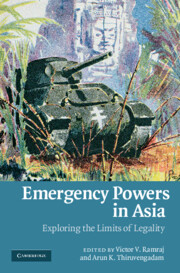Book contents
- Frontmatter
- Contents
- List of contributors
- Preface
- 1 Introduction: emergency powers and constitutionalism in Asia
- PART I Perspectives from legal and political theory
- PART II Postcolonial and post-conflict transitions
- 6 From Myanmar to Manila: a brief study of emergency powers in Southeast Asia
- 7 Discourses of emergency in colonial and postcolonial Burma
- 8 Emergency and Islamic law in Aceh
- 9 UNaccountable? The United Nations, emergency powers and the rule of law in Asia
- PART III Emergencies, executive power and constitutional order
- PART IV The role of the courts
- Index
- References
7 - Discourses of emergency in colonial and postcolonial Burma
from PART II - Postcolonial and post-conflict transitions
Published online by Cambridge University Press: 04 August 2010
- Frontmatter
- Contents
- List of contributors
- Preface
- 1 Introduction: emergency powers and constitutionalism in Asia
- PART I Perspectives from legal and political theory
- PART II Postcolonial and post-conflict transitions
- 6 From Myanmar to Manila: a brief study of emergency powers in Southeast Asia
- 7 Discourses of emergency in colonial and postcolonial Burma
- 8 Emergency and Islamic law in Aceh
- 9 UNaccountable? The United Nations, emergency powers and the rule of law in Asia
- PART III Emergencies, executive power and constitutional order
- PART IV The role of the courts
- Index
- References
Summary
Introduction
The notion of emergency has come to have a wide range of meanings and understandings that have stretched the range of possibilities for socio-legal research. Although emergency can refer to extraordinary medical, environmental, financial, and even perceived cultural crises, it is often discussed within the arena of politics and the law. Conceptually, emergency might be situated anywhere between that which is considered ‘normal’ and that which is considered ‘exceptional’, suggesting a variety of temporal and qualitative conditions that might delineate its parameters. In many respects, the very idea of emergency as an exceptional set of circumstances depends on and enables an understanding of what constitutes ‘non-emergency’ situations. From the perspective of the state (and those officials managing its administrative structures), emergency might be considered a category designed to make threats to society ‘legible’ by incorporating those elements into a familiar vocabulary of governance. For those seeking reform or advocating resistance to the state's definition of the status quo, the conditions associated with emergency can certainly come to mean very different things. It is the socio-legal context underlying this ambiguity that makes the defining of emergency (and conversely the defining of normality) in different cultural-political settings a provocative area of comparative research.
- Type
- Chapter
- Information
- Emergency Powers in AsiaExploring the Limits of Legality, pp. 187 - 212Publisher: Cambridge University PressPrint publication year: 2009
References
- 2
- Cited by



